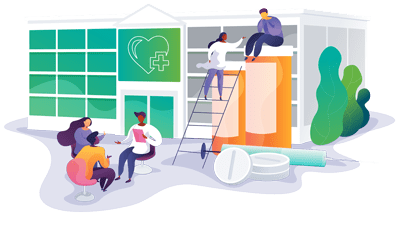Millions of Americans struggle with substance use disorder (SUD) and the trauma that accompanies it. In fact, SAMHSA found that approximately 20.3 million people aged 12 or older had a substance use disorder. While this number is startling, what is even more prevalent among Americans is the experience of psychological trauma — 70% of adults in the U.S., or 223.4 million people, have experienced some type of traumatic experience at least once in their lives.
Trauma is a risk factor in nearly all substance use disorders. Decades of research have found a strong link between exposure to traumatic events and SUD. Conversely, individuals with substance use disorders are also more likely to experience traumatic events, leaving millions of people in a perpetual cycle of traumatic experiences and increased risk for abusing substances.
But why do we have these connections between substance use and trauma? And, how can organizations and providers adequately address substance use and trauma when they co-occur?
The facts on substance use and trauma
The connection between SUDs and trauma span a wide range of populations, types of trauma, and types of SUDs. For example:
- 5% of individuals with post-traumatic stress disorder (PTSD) also met criteria for a substance use disorder diagnosis.
- One-quarter to three-quarters of people who have survived abusive or violent traumatic experiences report problematic alcohol use.
- One-tenth to one-third of people who survive accidents, illness-related, or disaster-related traumatic events report problematic alcohol use, especially if they experience persistent health problems or chronic pain after the event.
- Women who are exposed to traumatic events show an especially increased risk for alcohol use disorder.
- Men and women who have experienced sexual abuse have higher overall rates of alcohol and other substance use disorders.
- Most veterans have met criteria for a substance use and PTSD diagnosis. The National Vietnam Veterans Readjustment Study, conducted in the 1980s, reported 74% of Vietnam Veterans with PTSD also had a substance use disorder.
Additionally, when a person is experiencing distress due to both traumatic stress and substance use, they will often have other psychological or physical problems. Up to 50% of adults with both alcohol use disorder and PTSD also have one or more other serious psychological or physical conditions, including anxiety disorders, mood disorders, diabetes, heart disease, and chronic pain.
It is important to note that it is not only individuals with a diagnosis of PTSD who experience substance use disorders. Simply the experience of a traumatic event (without meeting the diagnostic criterial for PTSD or another trauma-related disorder) can result in an increased risk for substance use disorder.
Why the connection?
Why is there such a strong link between trauma and substance use? Throughout the 1990s, researchers offered several hypotheses to explain this connection, particularly with a focus on those who were diagnosed with PTSD:
- Self-medication hypothesis: People with PTSD use substances in an attempt to cope with or counteract their symptoms.
- High-risk hypothesis: People who abuse substances have higher rates of trauma as a result of their substance use (usually due to lifestyle choices associated with the substance use).
- Susceptibility hypothesis: People who use substances are more susceptible to developing PTSD after exposure to trauma than those who do not use substances.
One recent research study demonstrated that the hypothesis with the strongest evidence for support is the self-medication hypothesis, with some support for the high-risk hypothesis. However, there was no evidence in the study to support the susceptibility hypothesis.
Can you treat trauma and substance use disorder together?
Individuals with co-occurring SUD and trauma disorders have traditionally had poorer treatment outcomes. Previous treatment modalities attempted to separate the treatment of substance use and trauma disorders, focusing on one disorder at a time. However, the high rate at which these two conditions occur, as well as a better understanding of how trauma impacts the risk for substance use disorders, has led more mental and behavioral health organizations to promote the treatment of both disorders together.
For example, the 2017 Veterans Administration/Department of Defense Clinical Practice Guideline for PTSD recommends that evidence-based treatments for PTSD and substance use disorder, including psychotherapy and medication, be available to veterans concurrently. Additionally, it recommends that having one disorder should not preclude a veteran from receiving treatment for the other. This stance has been widely adopted by other organizations treating other populations for substance use and trauma.
How can providers best address trauma and substance use?
There is no single ideal type of program to treat co-occurring PTSD and substance use disorder. What is most important is that shared decision making, person-centered treatment, and a collaborative approach that includes trauma-specific and substance use-specific expertise is utilized. Additionally, the importance of having a trauma-informed framework for organizations that treat substance use disorder cannot be overstated. The ability to treat both the SUD as well as any underlying trauma that could be contributing to the disorder has shown positive effects in client treatment. This has been detailed in one individual’s experience with receiving trauma-informed substance use treatment. Implementing elements of the trauma-informed care framework can only help to benefit those who are struggling with substance use.
Most importantly, it is critical for clinicians and organizations to remember that individuals who have experienced trauma (as well as those struggling with substance use disorders) can, and do, recover. A recovery mindset and a focus on building resiliency is crucial for this population. Shifting the treatment paradigm to that of being trauma-informed and strengths-based can help yield the best results for the individuals served.

Training to Improve Substance Use and Addiction Treatment
Substance use disorders are complex conditions, meaning treatment is also complex due to the nature of SUDs. Relias has the resources to help train your staff on evidence-based treatment practices for substance use disorders.
Visit the Topic Page →





